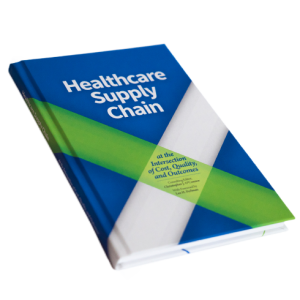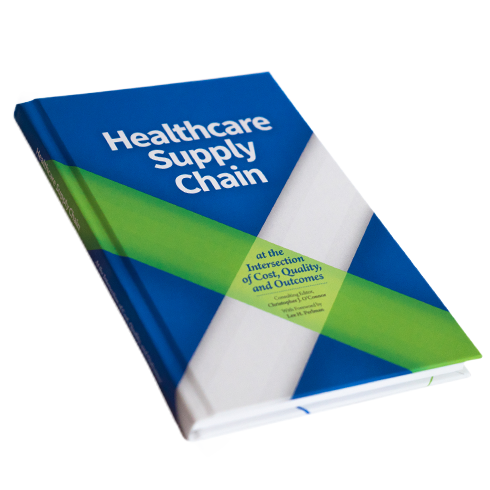 This month, supply chain professionals from across the country gather at the annual conference hosted by the Association for Healthcare Resource & Materials Management (AHRMM). In honor of the work they do, I am pleased to announce the release of the book Healthcare Supply Chain at the Intersection of Cost, Quality, and Outcomes produced by Nexera. While Nexera has been a leading voice in strategic supply chain for many years, this is our first publishing endeavor, and I’m proud to say that the content resulted from the dedicated collaboration of the Nexera team.
This month, supply chain professionals from across the country gather at the annual conference hosted by the Association for Healthcare Resource & Materials Management (AHRMM). In honor of the work they do, I am pleased to announce the release of the book Healthcare Supply Chain at the Intersection of Cost, Quality, and Outcomes produced by Nexera. While Nexera has been a leading voice in strategic supply chain for many years, this is our first publishing endeavor, and I’m proud to say that the content resulted from the dedicated collaboration of the Nexera team.
For those of you who may be unfamiliar with it, the CQO (cost, quality, and outcomes) Movement was created in 2013 by the AHRMM Board in response to the increasing need for hospitals and health systems to deliver high-quality, evidence-based care while simultaneously lowering costs in order to succeed in a value-based (rather than volume-based) reimbursement model. The book is designed to introduce the benefits of developing a strategic supply chain under the CQO model and to help hospital supply chain executives and leadership teams who are developing their clinically integrated value chains as part of a population health management strategy.
What is CQO?
Under the CQO model, supply chain professionals are compelled to focus on the intersection of three mechanisms (cost, quality, and outcomes) when embarking on enterprise-wide cost-reduction tactics’a significant departure from the race-to-the-lowest-cost metric on which supply chain professionals have traditionally been judged.
The three components of CQO are
- cost: supplies, services, and additional supply chain expenditures as well as the total cost of care;
- quality: patient care delivered consistent with efforts to achieve the best possible clinical outcomes; and
- outcomes: in the form of financial reimbursements that are driven by exceptional clinical care at the appropriate cost
Simply put, CQO is the strategic evaluation of cost and product inputs against clinical and financial outcomes, the very bedrock of value-based care.
Mapping the Path to Success
The book also serves as a guide to the Healthcare Supply Chain Self-AssessmentTM, a free electronic survey that was also developed by the Nexera consultants to help hospitals benchmark their supply chain performance. The self-assessment enables healthcare leaders to evaluate their current supply chain performance against 12 focus areas and outline steps to move toward a clinically integrated, strategic supply chain operating at the intersection of CQO. Individually and collectively, the 12 focus areas are believed to play a key role in influencing cost, quality, and outcomes. By taking the assessment, healthcare leaders can review current supply chain operations to see which areas can and should be improved. The book serves as a companion guide, outlining requirements needed to move from lower to higher levels of performance under a strategic, CQO-driven approach.
CQO: The Future of Supply Chain Evolution
The healthcare supply chain has a history of following reimbursement changes, from a price focus under fee-for-service medicine to a utilization/standardization approach under prospective payments. Adapting to a CQO model is the next phase in strategic supply chain under value-based reimbursement. To evolve into a true value chain, healthcare supply chain professionals need to shift their decision-making from low cost to best quality for the best price, engaging stakeholders throughout their organizations. The bottom line? Supply chain professionals have perhaps the greatest opportunity in recent history to bring significant value to the institutions, clinicians, and patients they serve. And CQO is the roadmap to delivering that value.
Nexera believes in the importance of CQO, and we have made it our mission to share the message with the industry. Of course, every hospital is different, with different cultures and different processes. Healthcare Supply Chain at the Intersection of Cost, Quality, and Outcomes isn’t a recipe for successful adoption of the CQO approach, but more like a menu of ingredients that, when combined based on your organization’s needs and goals, will move you closer to a clinically integrated supply chain. Again, the assessment is free. As always, if you have any questions or if Nexera can help your institution, please contact us (or find me at AHRMM 2015 in Indianapolis). Working together, supply chain professionals can change healthcare for the better, delivering higher-quality, lower-cost care for both healthier patients and healthier bottom lines.



Comments are closed.